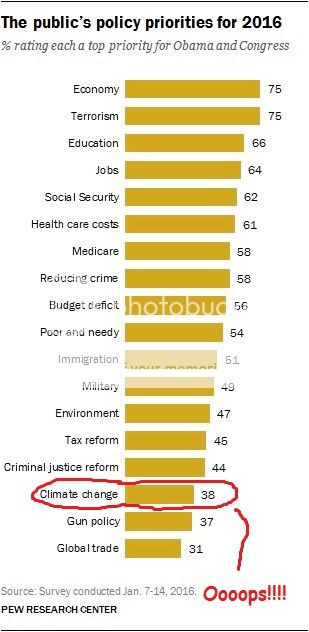RollingThunder
Gold Member
- Mar 22, 2010
- 4,818
- 525
- 155
Here's the facts - the Arctic is the fastest warming place on Earth....and the one being the most affected by warming and climate change. This lays it out....with links to all of the cited information.
January 2016 was the hottest month in the Arctic’s recorded history, with surface temperatures more than 4 degrees Celsius (7.2 degrees Fahrenheit) above the 1951 to 1980 average....
*
....Parts of the Arctic were 16°C above average, reaching temperatures more often seen in June....
*
....January was also the hottest month on record globally....AND the ninth 'hottest month on record' in a row....
*
....February was much hotter....in fact this last Febuary was the hottest month in the entire satellite record....
*
....marking the fifth straight month that global average temperatures were more than 1°C above average....
*
....and the Arctic region’s sea ice has taken the largest loss, reaching a record low for the month of February.

"February saw record low sea ice extent, with ice running a significant 448,000 square miles below average. In essence, a chunk of ice four times the size of Arizona went missing in action from the Arctic."
You can watch this stunning 23 second video of 26 years of Arctic sea ice loss and see for yourselves.
Here is a very good analysis of the situation in the Arctic from one of the top Polar ice scientists and researchers, Professor Peter Wadhams, an expert in ocean physics at the University of Cambridge, given on September 22nd, 2015, immediately prior to his departure on an expedition to the Arctic. (Too bad the dimwitted denier cultists have the attention span of a fruitfly or they might learn somthing....except, of course, for that prior fossil fuel industry-rightwingnut brainwashing that 'shields' them from actual knowledge and real science)
January 2016 was the hottest month in the Arctic’s recorded history, with surface temperatures more than 4 degrees Celsius (7.2 degrees Fahrenheit) above the 1951 to 1980 average....
*
....Parts of the Arctic were 16°C above average, reaching temperatures more often seen in June....
*
....January was also the hottest month on record globally....AND the ninth 'hottest month on record' in a row....
*
....February was much hotter....in fact this last Febuary was the hottest month in the entire satellite record....
*
....marking the fifth straight month that global average temperatures were more than 1°C above average....
*
....and the Arctic region’s sea ice has taken the largest loss, reaching a record low for the month of February.

"February saw record low sea ice extent, with ice running a significant 448,000 square miles below average. In essence, a chunk of ice four times the size of Arizona went missing in action from the Arctic."
You can watch this stunning 23 second video of 26 years of Arctic sea ice loss and see for yourselves.
Here is a very good analysis of the situation in the Arctic from one of the top Polar ice scientists and researchers, Professor Peter Wadhams, an expert in ocean physics at the University of Cambridge, given on September 22nd, 2015, immediately prior to his departure on an expedition to the Arctic. (Too bad the dimwitted denier cultists have the attention span of a fruitfly or they might learn somthing....except, of course, for that prior fossil fuel industry-rightwingnut brainwashing that 'shields' them from actual knowledge and real science)










